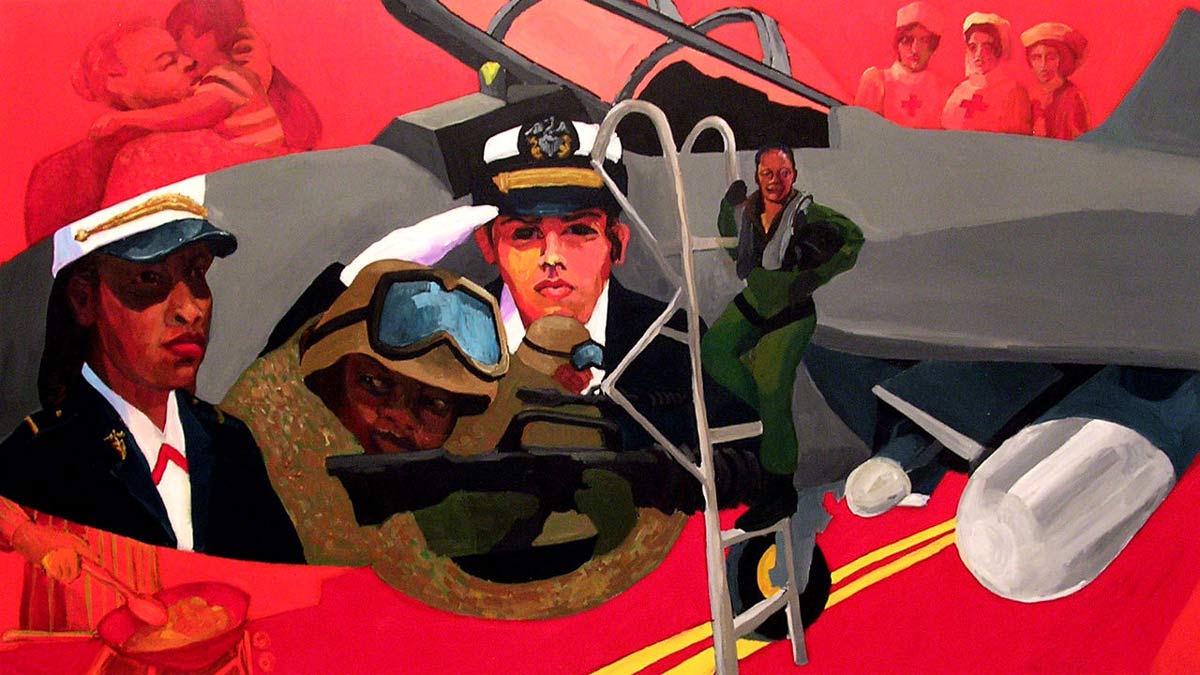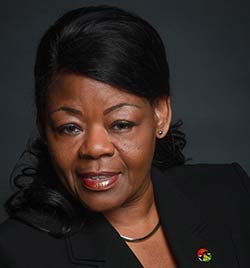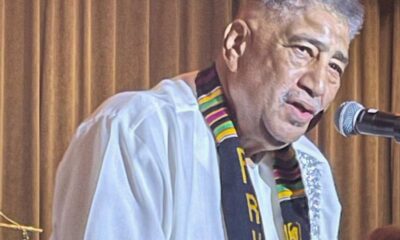Black History
Black Women Veterans Demand Social Justice

By Fern Gillespie
In remembrance of Veteran’s Day and the Black women who served this country, Our Time Press reached out to Wendy Charece McClinton, president, and CEO of Black Veterans for Social Justice, headquartered in Brooklyn. Wendy was in the Army for ten years, straight out of high school. She served in Desert Storm and was stationed at the Pentagon, Korea, Hawaii, and Washington DC offices. She graduated from the United States Army Logistical Management College and Stanford University Graduate School of Business. She holds a bachelor’s and master’s in theology and is a frontline advocate assisting Black women veterans.

“When I joined Black Veterans for Social Justice in 1997, I was the only female veteran in the organization. Men dominated it,” she told Our Time Press. “After a while, women began to come in for services. As women began to come in, there was a cry and a need for women to work with women.”
Wendy saw the need for more women in the agency working peer-to-peer with other veterans. “Because veterans tend to work better when they work with their peers,” she said. “So that’s when we started to see that we were going to start hiring these women veterans to work with women veterans and to work within the agency.”
Our Time Press was invited to talk with three Black women veterans who grew up in Brooklyn and traveled the world with the armed forces. There were life victories and tragedies. All found a career and mission with Black Veterans for Social Justice.
When Stephanie Copley joined the Navy, her long-term goal was to be an entrepreneur. In the Navy, she was a Petty Officer Third Class, a logistic specialist, and an aviation supply specialist. Her job was to order, restock and secure military supplies for a squadron. She had top-secret clearance.
“I picked the job because I wanted to run my own business, and I need to understand how inventory, procurement, and logistics worked,” she said.
Stephanie was a 16-year-old teen mom raising her daughter with the help of her family. “When you had children, you deployed one year on and one year off. She explained that I was deployed to Afghanistan, Portugal, Dubai, Greece, Italy, and Bahrain. “The most grueling time was traveling through the Suez Canal to get to Afghanistan. Then we are faced with pirates and cargo jackets, and you have weather like monsoons. We even lost two pilots on a flyover.”
After leaving the Navy in 2008, she opened a hair salon. But, she had a financial crisis when she lost her salon after three years, and there were no programs to help. “I hit rock bottom,” she said. “I feel we don’t have enough entrepreneurship endeavors for female minority veteran women who don’t want to go into engineering, science, and technology. Everything is so masculine. It’s helmets to hard hats. Not boots to stilettos.”
At Black Veterans for Social Justice, she started as an administrative assistant. “In the military, they teach you to be proactive, so I had no problem working at that level,” she said. “I later worked as a job coach, and now I’m an employment specialist.”
For LaShena Boyer, joining the Navy was the opportunity to get a college education. While in service as Petty Officer Second Class during the early 2000s. She attended military college and earned an associate degree as a medical assistant. She was deployed on the USS Abraham Lincoln and traveled to Australia, Hong Kong, Hawaii, and Singapore. Her job in the service was working in personnel and military pay.
“My ship did the tsunami in Indonesia and Thailand. I woke up one morning on watch, and it looked like there were one million dead bodies in the water. It changed my life and how I feel about people. It changed me.”
After retiring, she moved back to New York to help her ill mother. She used the GI Bill for a Fashion Institute of Technology associate degree in fashion merchandising and even worked at a modeling agency. Then the stress of job loss, caring for an ill parent, and the PTSD from the military became overwhelming.
“There wasn’t anything for mental health the way the programs are out there now,” she said. “The most help I got from anybody was when I got in trouble. I had PTSD when I got out of the military. I did something and, unfortunately, got incarcerated. Locked up,” she said. “That’s the most help I ever received was being the vet in trouble. Instead of being honorable when I came out of the military. I just needed help.”
She sought help at Black Veterans for Social Justice. Today, LaShena works in the BVSJ human resources payroll department.
The Army had been Pauline Footman’s career for almost 30 years. She joined the Army as an MSG (master sergeant) in 1980. Then in 1985, she had to resign because she was a single mother. Instead, the Department of Defense hired her as an Army Reservist, and she served from 1985 to 2012.
“As a reservist, I was a jack of all trades. I had a dual status. That’s something I liked about the service back then,” she said. “In the military, I was a supply specialist; then, I was a key liaison overseas. I was a payroll and human resource administrator. I did budgeting for many of my soldiers. I had to go to military school. I had to schedule physicals for all of my soldiers. I was the first sergeant also for over 220 soldiers.”
The main thing she liked about the military was traveling. “I met beautiful people from different countries. We used to go to homes in Italy and Germany,” she said. “These people were very welcoming of the military. They would prepare us meals. Invite us to restaurants and things like that.”
She did Desert Storm, Desert Shield, and Operation Enduring Freedom under President Bush from 2003 to 2005 after 9-11. “The military has been good to me,” she said. “At the VA, I was able to get treated for cancer early, and I am a survivor now because of the services they provide for women to be tested.”
Through the G.I. Bill, she attended Colorado Technical University and majored in case management and business administration.
At Black Veterans for Social Justice, she’s worked in case of management for eight years focusing on mental health for clients. “People suffer from mental illness.” She said. “I believe people need to talk with the family members about PTSD so they can understand it more.”
“Through the military, we have what’s called transferable skills. The things that we did in the military, we transfer those things to our civilian life,” said McClinton. “You not only have your computer skills, but you also have a degree, you’re articulate, you’re able to work with different technologies systems. You also bring some other things we have in the military–loyalty, trust, honor, and camaraderie.”



